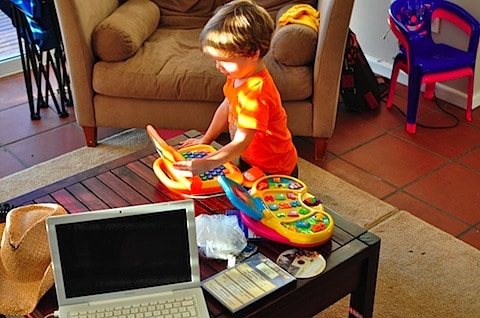It’s a thought that keeps occurring, when I send and receive emails, texts, tweets and Facebook wall posts. When I sit across the table from folks for a meeting or a cup of coffee. And sadly, most often when I’m visiting my home country. It’s simply:
The more ways we have to communicate, the worse we are getting at communicating well.

Example. People host email on their phones so they can respond to emails quickly. Great. But sometimes the replies make this recipient feel like someone just wants me off the to-do list ASAP. Often, there are three other questions in my email that don’t get answered via Blackberry, and I have to email again.
At the heart of every message, we communicate because we seek connection. If I remember anything from my freshman Communications classes at Uni, I remember that there’s a sender, there’s a method of transmission, there’s a message, and there’s a recipient. And a lot can go wrong in between.
In face to face conversation, as much as 90% of what we’re communicating is not necessarily said with the words coming out of our mouths. The tone we use to say those words matters. Facial expressions, body language, the loudness or softness of our voice, the gestures we make with our hands and sometimes just the look in our eyes — all these things contribute to what we are saying, without words.
Although the indicators are different, Social Media definitely has its own brand of nonverbal communication.
LOL. :-* OMG! K, thanks, bye.
And again, it is not just what is said, but what is left unsaid. When “Dear ____” or “Sincerely ____” no longer start or finish an email. When we speed type because we’re busy, we want to be more productive, or {a Collie house *dislike*} we are replying to your email from our Blackberry.
The more ways we have to communicate, the worse we are getting at communicating well.
A Tale of Two Meetings
On this last visit home, it seemed like a fourth member of the party without a chair often joined us at the table. Mrs. Blackberry or Mr. iPhone, who wouldn’t be ordering off the menu or picking up the check, might still cut us off mid-sentence or make it difficult to carry on a steady conversation. And what isn’t said — the unintended message — is what I really hear: You are pretty important, but I want to keep my options open in case something more important comes along.
We recently went to a meeting that was very important to us. The other party also said it was important, but sat down and immediately sat the Blackberry on the table. With each grumbly vibration, a call was screened, and I felt my personal self worth being weighed in the balance. Is this meeting more or less important than taking this call? I’ll press ignore.
{Conversation continues…}
Another vibration. Is this conversation more or less important than this call?
{Conversation pauses for a decision to be made.} Ignore.
Next vibration: Is this conversation more important than this call? No. We’re asked to wait for the call to be taken.
Afterwards, the Hubs mentioned that he’d considered leaving the room and calling the person we were meeting with to see if we could chat over the phone and perhaps get more accomplished.
The alternative: There’s a wonderful pastor we sometimes visit while we’re back in the Carolinas who has the uncanny ability to meet with you and, start to finish, seem completely undistracted. For the hour we’re in his office, it feels like nothing in the world is going to take his focus off the time with us. He looks you in the eyes, listens with all his being, and is slow to form a response. I leave feeling valued and wanting to remember to show the same kindness to others. {I can’t say I’ve acquired the skill yet.}
I’m aware that life has emergencies. We’re waiting on a call because our wife could go into labour any time. Our Mom is in surgery. We’re waiting to hear the results…it could be cancer.
In these cases, we can be kind enough to explain to the person sitting in front of us the reason why we might ‘divert’ our real life conversation for the sake of a phone call that could go to voicemail instead. But should we screen every call as if we’re constantly expecting an emergency?
I’m not recommending we go back to the days when long distance communication only happened with a telephone wired to the wall or with paper, pen and a postage stamp. I do want us to think about what we’re communicating through new mediums of technology, based on what we say, and what we don’t.
Could we be missing the boat if we place higher value on the phone on the table than the real live person sitting across from us? {I am guilty of burying myself in my Macbook, so I’m speaking to me, too.}
At the heart of it all, we Facebook and tweet, we blog and email, we call and write, and we meet for coffee or dinner because we want to know that we matter. We want to know our lives matter. We want to know somebody thinks we’re worth paying attention to. The sending and receiving of messages is about connection.
I recently read a letter from a friend to a friend and these words struck me:
Thank you for smiling at me every time I walk in the door. Thank you for talking to me like I am the most important person to you at that moment.
That’s the stuff that matters.
My prayer in a nutshell: Jesus, You were incredibly focused on loving the person in front of you. Lord, help us, in every way that we communicate, to be better at loving and valuing each other. Let our messages to one another communicate You’re important and You matter more than anything else, because everyone matters to You.

 I create resources to help people find deeper, more meaningful relationships with God through pursuing, pondering, and prayer. The "Shop" link above will take you to the home of many of the lovely resources I’ve created to help you keep walking one day deeper with Jesus.
I create resources to help people find deeper, more meaningful relationships with God through pursuing, pondering, and prayer. The "Shop" link above will take you to the home of many of the lovely resources I’ve created to help you keep walking one day deeper with Jesus.
Oh, the Blackberry…
It is so true and so sad. We all need to remember that human interaction is WAY better than mashing buttons!
Great post, Caroline and so true. One of my biggest peeves is phones at the table. No one cares to actually sit and talk without disruption these days and I find it to be extremely annoying. You did a great job of saying what is on my mind a lot of the time.
I am glad I’m not the only one! I am thinking about having a no phones at the table policy for guests having dinner at my home…is that okay? 🙂